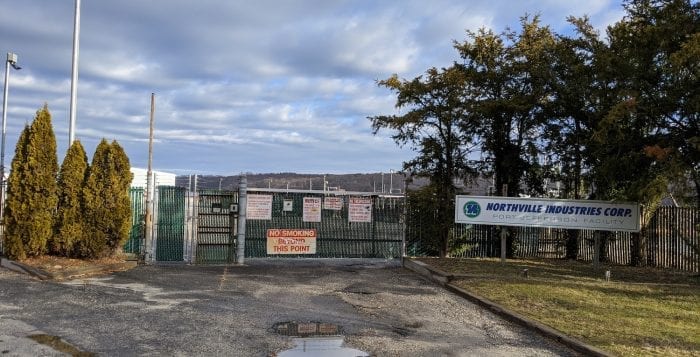Brookhaven Renews Lease for Port Jeff Harbor Oil Transport Company

The Town of Brookhaven has renewed leases on two entities in Port Jefferson Harbor, but one of those operations has local environmentalists a little concerned.
The Town voted unanimously Jan. 30 to renew the lease for the Port Jefferson/Setauket Yacht Club (which is more known as simply the Port Jefferson Yacht Club) as well as the Melville-headquartered Northville Industries for use in its underwater and uplands properties on the eastern end of the harbor. The licensee has operated in that location since 1975, according to Town attorney Annette Eaderesto.
The yacht club’s lease has gone up to $35,100 for 20 years with a 3 percent annual increase. The club’s land includes around .892 acre underwater and 2.723 acres upland, including the club facilities.
“Oil transport is inherently a dirty operation.”
— George Hoffman
Northville’s operation has oil being brought in on ship or barge to the Port Jeff terminal, where it is shipped via either of two 16-inch pipelines up to its storage farm in East Setauket before moving on to a Holtsville terminal via a 12-inch pipeline, according to the company’s website.
The oil transport company’s lease now increases to $77,322 based on a new appraisal, which includes around $40K for the underwater portion and around $37K for the upland portion. The company has agreed to pay slightly more than what the upland portion was appraised for. The 20-year term is set to increase annually by 3 percent. The company has had the lease since 1975, and the Town attorney said the company has not had any claims against the town.
George Hoffman, the co-founder of Setauket Harbor Task Force, said he had several concerns over the company’s continued engagement with the harbor. His group has been doing more and more testing of the Port Jefferson harbor in the past two years, having just finished the second season of testing. He asked for strict liability regarding the oil transport company.
“Oil transport is inherently a dirty operation,” he said. “There’s always tiny spills, no matter how hard they work there is always going to be problems.”
Eaderesto said Northville does not post a bond in case of any ruptures, and any spills are handled by the state Department of Environmental Conservation. Miller Marine Services, a regional company with a site right next to the oil transport company, is there for immediate response.
Steven Ripp, the chief operating officer of NIC Holding Corp., the parent company of Northville, denied there has been any leaking or spills into the harbor from their operations, further arguing the company would be able to contain any major spills into the immediate area of their operations on the harbor’s east end.
“There are never any minor spills, not even a gallon,” he said. “If there is a spillage whatsoever, we have to immediately report it to DEC and take swift action.”
Northville has been previously cited by the DEC. In 1987, Northville notified the DEC of a gasoline leak at its East Setauket site of approximately 1.2 million gallons that had leaked into the ground over a 10-year period. That gasoline had penetrated into the ground and reached the water table 100 feet below the surface.
The company had settled with the DEC for a $25 million cleanup plan after the spill. In 2006, after a long and complicated cleanup process, the DEC reported Northville had completed all remediation.
In a later interview, Hoffman said he came away from the public hearing with more concerns, not less, especially concerning the overall health of the Port Jefferson Harbor and the age of the pipelines running over into East Setauket.
“This is going to be potentially 30 years — I didn’t feel comfortable about that,” he said.
When asked, the general manager at Northville, Peter St. Germaine, did not relate anything about the age of the pipe, instead saying it is frequently inspected by the state.
“There are never any minor spills, not even a gallon.”
— Steven Ripp
A spokesperson for the state DEC said the agency inspects the facilities for petroleum bulk storage and major oil storage facility regulations. Recent inspections were performed in 2007, 2008, 2009, 2011, 2013, 2015 and 2018. The DEC also conducts a review of the facility license renewal application, testing of certain tanks and secondary containment areas, and groundwater results from 12 monitoring wells at the East Setauket location, as well as two monitoring wells at the Beach Street site. The wells are sampled every six months.
Eaderesto said the town is able to back out of any lease at any time should the need arise.
Supervisor Ed Romaine (R) said he is aware of the need for attention paid to Port Jefferson Harbor, especially considering the effluent from both Stony Brook University and Port Jeff treatment plants flows into the harbor as well.
Ripp said the location received hundreds of barges of oil a year, and through their pipelines run hundreds of millions of gallons, “safely” every year.
“It is a critical facility for the Town of Brookhaven,” he added.
Northville isn’t the only industrial company to work close to the harbor. Along Beach Street in Port Jeff the Tilcon quarry is constantly operating with heavy moving equipment. The area also includes the LIPA power station to the north of both operations.
Romaine said his concern was the location and that the lease would conflict with plans of a joint venture of Ørsted and Eversource to make Port Jeff a hub for planned wind turbines off the coast of Montauk. However, the town attorney said the lease is just an extension of a lease that has been in effect for several years.
Councilwoman Valerie Cartright (D-Port Jefferson Station) said she had initial concerns regarding community comments and ensuring proper liability coverage, but those concerns had been assuaged by the town law department, and she thanked the company for, “being a good licensee over the years.”
Both leases for upland and underwater land were set to expire April 30, 2020. The new license terms go 20 years with the availability of two 5-year extension options for the town.






